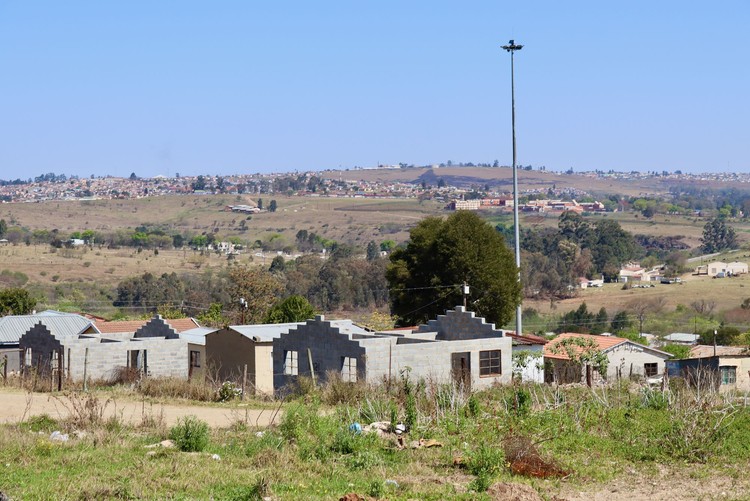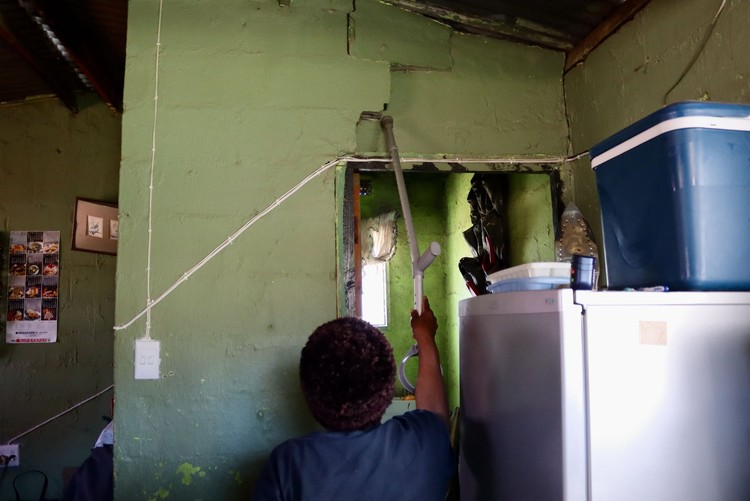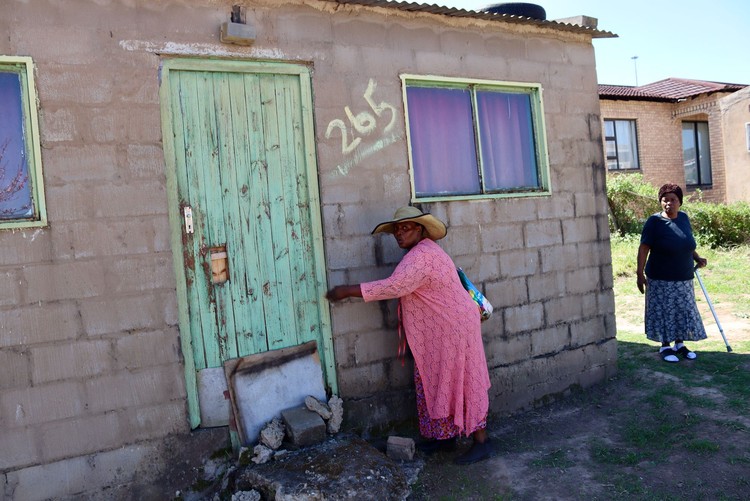After 24 years, almost 1,000 RDP houses in Mthatha are still not finished
The Hawks are now investigating
Meyden Farm RDP houses built in 1999 were never finished. Some were demolished and rebuilt, but most of these were also substandard. Photos: Nombulelo Damba-Hendrik
- In 1999, shack dwellers in Mthatha were moved into 969 RDP homes, only to find the houses were very badly built.
- Only in 2017 was a rectification project started. It only managed to demolish and rebuild about 100 of the homes in six years.
- People given rebuilt homes were disappointed to find that these too were substandard.
- The Eastern Cape Department of Human Settlements has ignored our questions.
In 1999, Meyden Farm shack dwellers were given RDP houses. But, says community leader Qaqamba Hlupheka, their new homes were of very poor quality – the plaster was already cracking, roofs were leaking, and some walls had holes right through them.
Only in 2017 did the Eastern Cape Department of Human Settlements award a tender to Cross Border Development Consultants to rectify all 969 houses. According to Hlupheka, this was meant to be a three-year contract.
But the company has not completed the work years after this deadline. Of the 969 houses, more than 100 had to be demolished.
When the project started people moved to temporary tin houses nearby, but most residents have returned to their badly built homes.
“Last year they only worked from October to December. They came back in January, only to work for a few weeks,” says Hlupheka.
Cross Border rebuilt about 100 houses before it completely abandoned the site in March 2023. Residents say out of these, only 30 were decently built. Most households had once again been given substandard houses.
The company is now in liquidation.
Nosizwe Njici showing the shoddy construction of her home.
Hlupheka said they went to the Eastern Cape Department of Human Settlements’ office in Mthatha in June.
“We spoke with the regional director. He was very shocked when we told him that the contractor had left the site. He told us that as far as he knows the contractor is still on site working,” said Hlupheka
She said the regional director acted shocked that the contractor had left the site, which she found strange as he is the person responsible for the project.
She said the regional director and another official promised to investigate the matter.
According to residents, in September when the regional director failed to turn up for a report-back meeting, the community started to protest.
Hlupheka received her rebuilt house (one of the 100) in December 2019.
“What they used to do was that when they leave in December, they will give beneficiaries house keys. Then, when we complain about the leakages and broken doors, they would promise to fix them when they return the following year. But that never happened,” said Hlupheka.
Community leader Buyiswa Sibali said: “There were two officials from the department that were part of this project, but they kept quiet while things were going bad. Now we are hearing that the contractor claimed R24-million in 2020, for houses that they did not build. I blame the department for all this mess.”
Sibali said Cross Border also had a subcontractor, which in turn also subcontracted.
“In between there were other subcontractors and some left crying, saying that they were not paid,” she said.
“Our government is failing us, imagine being given a house with cracks twice.”
Resident Nosizwe Njici, 67, lives in her original house.
“When it rains, water comes inside the house. The roof moves when it is windy. My fear is that this house will fall down any day, and this is the only house I have,” said Njici.
Eastern Cape Hawks spokesperson Yolisa Mgolodela confirmed the Hawks will investigate, but had only just received the docket.
Attorney for the liquidators of Cross Border Development Consultants, Derek Schickerling, said he would respond to our questions once he spoke with the client. He has since stopped taking our calls.
GroundUp has been trying since September to get a response from Eastern Cape Department of Human Settlement’s spokespersons Phiwokuhle Soga and Siyabonga Mdodi. They have stopped taking our calls although WhatsApp messages are blue ticked.
Community leader Buyiswa Sibali outside Nosizwe Njici’s RDP house.
Support independent journalism
Donate using Payfast

Don't miss out on the latest news
We respect your privacy, and promise we won't spam you.
© 2023 GroundUp. This article is licensed under a Creative Commons Attribution-NoDerivatives 4.0 International License.
You may republish this article, so long as you credit the authors and GroundUp, and do not change the text. Please include a link back to the original article.
We put an invisible pixel in the article so that we can count traffic to republishers. All analytics tools are solely on our servers. We do not give our logs to any third party. Logs are deleted after two weeks. We do not use any IP address identifying information except to count regional traffic. We are solely interested in counting hits, not tracking users. If you republish, please do not delete the invisible pixel.



